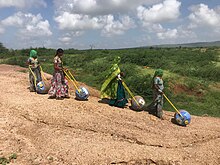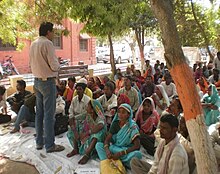India Development and Relief Fund
| Formation | 1988 |
|---|---|
| Type | Non-profit/ Public charity |
| Purpose | Enhance sustainable and equitable access to education, health, agriculture, water and sanitation, and infrastructure to target groups with a rapid response to victims of a disaster. |
| Location | |
| Coordinates | 39°02′16″N 77°07′06″W / 39.03787°N 77.118294°W |
Region served | India, Nepal and Sri Lanka |
Key people | Vinod Prakash |
| Website | www |
India Development and Relief Fund (IDRF)[1] is a Maryland, USA-based 501(c) (3) tax-exempt, non-profit organization (EIN: 52-1555563)[2] that supports impoverished people in India, Nepal and Sri Lanka. Since its inception in 1988, IDRF has disbursed over $50 million in grants for various developmental programs focusing on education and skill development, healthcare, women and community empowerment, environmental sustainability, good governance and innovation, and disaster relief/rehabilitation. IDRF keeps its administrative costs low, relying on our dedicated staff and volunteers to lead substantive dialog with partners. IDRF serves the disadvantaged without regard to race, religion, caste, or creed.
About
IDRF was founded in 1988 by Dr. Vinod Prakash, a former World Bank development economist, who has volunteered for IDRF since he founded it. IDRF partners with NGOs in India, Nepal, and Sri Lanka who meet the respective government compliance standards, and support innovative approaches for addressing issues critical to the well-being of target groups. IDRF encourages partner NGOs to proactively collaborate with local communities, government and public entities, and other like-minded NGOs to promote sustainable, scalable impact and to create synergies. For donors interested in specific causes and/or local partners, IDRF facilitates channeling of their ear-marked support while assuring consistency with its Vision and Mission.
IDRF maintains a close collaboration with the Indian American community and helps them realize their dreams of giving back to their “motherland” or" land of their ancestors".

Focus Areas of Development and Relief Programs
Education and Skill Development:
- Vocational training programs for unemployed and school dropout rural youth and women.
- Scholarships for academically bright but economically disadvantaged girls for higher education.
- Online digital libraries and tablet libraries, etc.
- Free education and hostel for underprivileged tribal girls.
- Computer literacy and digital skills to students from underprivileged communities.
- Daycare for children with special needs.

Healthcare: IDRF provides health services to poor people living in remote, hilly, and tribal areas and slums. These services are provided either free or at nominal charges.
- Rural Sanitation Units in Gujarat, Telangana, West Bengal, Tamil Nadu and Maharashtra.
- 30+ mobile medical clinics in various Indian states.
- Home for destitute, elderly women and abandoned /orphaned children.
- Hospitals, pathology Lab-OPD clinic, and dispensaries for the poor.
- Nutritional supplements for malnourished children, and anemic mothers.
- Free health camps to screen and provide medicines to the poor.

Women and community empowerment:
- Skill development and training for livelihood support.
- Self-Help Groups for economic self-reliance.
- Revolving Micro-loans to over 5,000 women-led small business enterprises.
- Organic farming and sustainable livelihood training.
- Construction of STEM labs in girls’ schools and colleges.
Environmental sustainability: IDRF funds programs that facilitate rural enterprises by incorporating clean-energy technology and practices and also in the conservation of biodiversity and natural resources.
- Provision of water through Rain Harvesting in arid areas.
- Training for organic and efficient farming techniques to farmers.
- Eco-friendly micro-enterprises by women – organic café, bakery, soap and candle making, food preservation, etc.
- Solar power generation, assembly, and distribution of solar-powered lanterns.
- Construction and revival of water structures like ponds, wells, check dams, etc.
- Water Wheels (containers on wheels) for women to carry water for daily household use.
- Setting up of Biogas units for rural families to use for cooking instead of LPG stoves or wood.
- Plantation of economic trees.

Disaster relief and rehabilitation:
- Relief kits (food and hygiene items) for victims of disasters.
- Rehabilitating the victims by repairing and reconstructing houses.
- Financial and skill training help victims/families with sustainable livelihood options.

Good governance and innovation
- Increasing women and schedule caste members’ participation in rural local governance.
- Reporting bribery cases via mobile apps.
- Preventing and reducing gender-based violence.
- Empowering marginalized communities by facilitating access to entitlement documents and government social security schemes.
- Facilitating the socio-economic and cultural assimilation of refugee communities into local society.

Impact
IDRF has benefitted tens and thousands of people irrespective of race, religion, caste, or creed through its various development and relief/rehab programs since its inception. Some IDRF accomplishments since 1988:
- Received top-most accreditations and recognition for transparency and accountability from charity assessment organizations in the United States like Charity Navigator, Guidestar by Candid, and Greatnonprofits.
- Raised over $56 million for development and relief programs for marginalized communities.
- Overheads barely 5%, so 95 cents of $1 goes directly to beneficiary NGOs.
- 2,130 Women's Self-Help Groups supported in 333 villages of Haryana, Maharashtra and West Bengal.
- 2,500 private toilets constructed for the rural poor in Gujarat, West Bengal, and Tamil Nadu.
- 10,000 students helped in schools and care homes/orphanages in nine states across India.
- 27,000 students in 400 schools trained to be responsible citizens across 12 cities in India.
- 48 Gram Panchayats in 10 districts of Bihar and Jharkhand trained to access government programs and combat corruption.
- Supported disaster relief and rehab programs for the COVID pandemic, annual floods, Nepal earthquake, Tsunami, Gujarat earthquake, Odisha Super cyclone, Kargil War, and Latur earthquake, etc.[citation needed]
- 100+ reliable and trusted NGO partners in over 21 states of India.
- NGO partners maintain financial accountability and compliance with local government laws and are approved to receive funds from the USA.
Accreditation and Compliance Standards
IDRF has a high standard of compliance and fully verifies the reputation and reliability of an NGO before extending a helping hand and making it a partner in sustainable development projects. IDRF also encourages site visits to its various projects by the Board Members, donors, and volunteers, in addition to receiving periodic reports and financial explanations of the funds invested.
IDRF has the highest ratings from Charity Navigator (Four out of Four Stars) and is featured in the ‘Top 10 perfect score (100%) charities relying on Private contributions’, Platinum Seal from GuideStar and Top Charity 5-stars from GreatNonProfits, based on independent reviews. IDRF has been able to keep its overheads (administration + fundraising) costs to only 5% so 95% of donations go directly to the beneficiary organizations having impeccable track records of their accountability and transparency. IDRF is also a member of the Combined Federal Campaign (CFC), the country’s largest workplace campaign for giving, which allows federal employees to contribute to a network of vetted organizations. The World Bank Group has added IDRF to its Community Connections Campaign so that the staff, contractors, and retirees can contribute to IDRF through payroll deductions and direct gifts. Starting in 2014, the World Bank now matches 100% of their gifts.
- ^ IDRF is a registered trademark of India Development and Relief Fund, Inc. USA
- ^ http://www.idrf.org/wp-content/uploads/Tax-determination-Letter-2018.pdf [bare URL PDF]
- Pages using gadget WikiMiniAtlas
- Articles with short description
- Short description is different from Wikidata
- Articles needing cleanup from August 2022
- Articles with bare URLs for citations from August 2022
- All articles with bare URLs for citations
- Articles covered by WikiProject Wikify from August 2022
- All articles covered by WikiProject Wikify
- Wikipedia neutral point of view disputes from January 2019
- All Wikipedia neutral point of view disputes
- Coordinates not on Wikidata
- All articles with unsourced statements
- Articles with unsourced statements from April 2022
- Articles with bare URLs for citations from March 2022
- Articles with PDF format bare URLs for citations